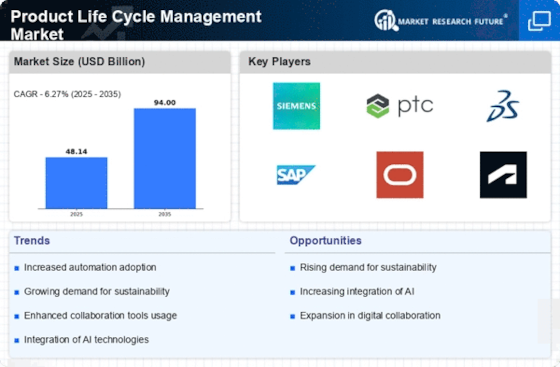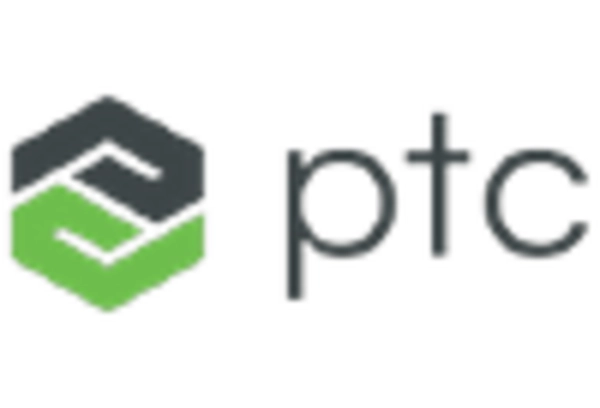Market Analysis
Product Life Cycle Management (Global, 2023)
Introduction
Product Life-Cycle Management (PLM) is increasingly recognized as an important component in the strategic management of product development and innovation. PLM is increasingly becoming a key success factor for companies that are looking to increase their efficiency, reduce time-to-market and improve the quality of their products. PLM solutions are designed to integrate the data, processes and people involved in the entire product life-cycle, from the concept and design phase to manufacturing and the end-of-life phase. The increasing complexity of products, as well as the increasing regulatory and legal requirements, has also made the demand for PLM systems grow. Today, companies are increasingly using advanced technologies such as artificial intelligence, the cloud and the Internet of Things to optimize their PLM processes and gain a competitive advantage in the rapidly changing market. This report examines the current PLM market and the key trends, challenges and opportunities that are shaping the future of PLM.
PESTLE Analysis
- Political
- In 2023, the PLM market will be affected by a number of political factors, such as government regulations and trade policies. In Europe, for example, the e-GIPS* legislation, which affects the way product data and product life-cycle information is managed, will affect companies in some 27 member states. The United States, on the other hand, has allocated $ 1.2 billion to the digitalization of its industry, which will also help to improve PLM systems.
- Economic
- In 2023, there is a growing emphasis on cost reduction and efficiency in production and product development. The global manufacturing industry is expected to invest $ 1 , 5 billion in digital transformation, including the use of PLM. The unemployment rate in the manufacturing industry is expected to stabilize at 4.2 percent, indicating a stable workforce that can support the use of advanced PLM technology.
- Social
- In 2023, social trends are reflected in a growing demand for sustainable and ethically produced products. The fact that more than 70 per cent of consumers are willing to pay a higher price for sustainable products means that companies are being driven to adopt PLM systems that can monitor and manage the sustainability of their products. Also, the workforce is increasingly diverse: 39 per cent of the manufacturing workforce is female. This influences the development and life-cycle strategies of companies, which are now more inclusive.
- Technological
- By 2023, the PLM market will be transformed by the speed of technological development. Artificial intelligence and machine learning are expected to improve the ability to analyze data in PLM systems, and more than 60% of companies plan to implement PLM solutions with the help of artificial intelligence. Cloud-based PLM is also on the rise, and 45% of companies will migrate to the cloud to improve collaboration and access to data.
- Legal
- The legal factors influencing the PLM market in 2023 include the compliance requirements of data protection and intellectual property. The General Data Protection Regulation (GDPR) continues to have an impact on the way companies manage product data, with fines of up to 20 million euros or 4% of turnover for non-compliance. And with more than 300 new patents in the PLM field, companies are required to navigate a complex legal landscape.
- Environmental
- In 2023, the PLM market will be increasingly influenced by environmental concerns. The focus will be on reducing carbon footprints and waste. By the end of the year, about 50% of companies in the EU will have to report on their carbon footprint as part of the European Union's Corporate Social Responsibility Reporting Directive (CRSRD). In response to this regulatory framework, companies are adopting PLM systems that are able to track and report on sustainability metrics, which will encourage the development of sustainable products.
Porter's Five Forces
- Threat of New Entrants
- The Product Lifecycle Management (PLM) market has medium barriers to entry because of the significant investment required in both technology and skills. However, the market is large enough to offer opportunities for new players, although it is dominated by well-established companies with strong brand recognition and customer loyalty. The need to comply with regulations and the need to integrate with existing systems are also a deterrent to new entrants.
- Bargaining Power of Suppliers
- Suppliers in the PLM market generally have low bargaining power, because there are many suppliers offering similar products and services. This means that companies can easily change suppliers, which limits the influence of any single supplier. However, specialized technology suppliers can have a slightly higher bargaining power if they offer unique features.
- Bargaining Power of Buyers
- The buyers in the PLM market have a high degree of bargaining power, as they are often large organizations with considerable buying power. The fact that there are so many PLM solutions on the market enables them to negotiate the best prices and conditions. Moreover, the growing demand for customized solutions gives buyers the opportunity to influence product development and pricing strategies.
- Threat of Substitutes
- The threat of substitutes in the PLM market is moderate, as alternative solutions such as traditional project management tools or other enterprise software can perform similar functions. These alternatives, however, lack the specific features and integrations that PLM solutions offer, which may limit their effectiveness in managing product life cycles.
- Competitive Rivalry
- Competition is high in the PLM market, with many established and new entrants competing for market share. The market is characterized by intense competition, which has led to aggressive marketing and price wars. The rapid pace of technological change also intensifies competition as companies strive to offer the most advanced solutions.
SWOT Analysis
Strengths
- Enhanced collaboration across departments leading to improved product quality.
- Increased efficiency in product development processes through automation.
- Ability to track and manage product data throughout its lifecycle.
- Strong demand for PLM solutions in various industries, including manufacturing and retail.
Weaknesses
- High initial investment costs for implementing PLM systems.
- Complexity in integrating PLM with existing enterprise systems.
- Resistance to change from employees accustomed to traditional processes.
- Limited awareness and understanding of PLM benefits among smaller companies.
Opportunities
- Growing trend towards digital transformation in businesses.
- Expansion of PLM solutions into emerging markets.
- Increased focus on sustainability and eco-friendly product development.
- Advancements in AI and machine learning can enhance PLM capabilities.
Threats
- Intense competition from established PLM vendors and new entrants.
- Rapid technological changes requiring constant updates and adaptations.
- Economic downturns affecting IT budgets and spending on PLM solutions.
- Data security concerns related to cloud-based PLM systems.
Summary
Product Lifecycle Management (PLM) in 2023 will be characterized by a high degree of collaboration and productivity, but it will also be characterized by high costs and integration difficulties. Opportunities will arise from digital transformation and sustainability, but competition and economics will be a threat. To remain competitive, companies must exploit the technological opportunities and overcome the weaknesses.



















Leave a Comment